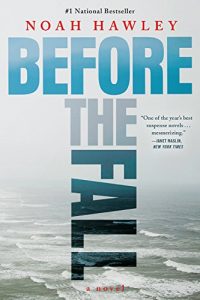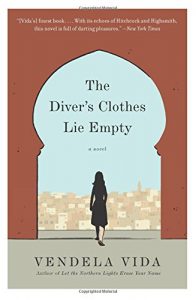Elegance by Kathleen Tessaro
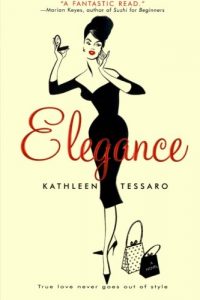 I have always admired Audrey-Hepburn-like-elegance, but alas, my body and temperament opt for comfort. Once, on a daily basis, I achieved tailored and professional — but never elegant.
I have always admired Audrey-Hepburn-like-elegance, but alas, my body and temperament opt for comfort. Once, on a daily basis, I achieved tailored and professional — but never elegant.
This appreciation for long necks and sleek evening dresses must have caused me to acquire this book. I found it during my January book clean out and stacked it on my bedside table, unsure, but vowing to give it my 50 page audition.
The other night I picked up Elegance, and was surprised to find myself chuckling at this cute concoction. I’m not a fan of chic lit, but the premise is clever.
The author actually found a book in a second-hand store called “Elegance: A Complete Guide for Every Woman Who wants to Be Well and Properly Dressed on All Occasions” written by Genevieve Antoine Dariaux in 1964. Ms. Tassaro, with permission from Dariaux, wrote this novel based on her find. See? Clever right?
The novel uses the advice from Dariaux at the start of each chapter, such as this from the opening:
What is elegance? It is a sort of harmony that rather resembles beauty with the difference that the latter is more often a gift of nature and the former a result of art. If I may be permitted to use a high sounding word for such a minor art. I would say that to transform a plain woman in to an elegant one is my mission in life.
Our protagonist, Louise, either heeds or disregards this out-dated (and often derivative) advice as she contemplates her own disastrous life.
Louise is an imperfectly real character. Her past is filled with eating issues, difficult parents, failed relationships, and a lackluster career.
Her marriage is over:
It’s been months now – months of conversations, arguments, silences, tears. We have ‘given it one more week’ again and again and again. It’s like trying to amputate a limb with spoon.
Louise is not getting anything from her therapy sessions:
[Therapists] always want to know why; there’s not a lot of difference between a therapist and a four-year old.
She doesn’t have any close girlfriends to talk to, she’s lost, and can’t pinpoint what she really wants.
Then one day Louise finds Dariaux‘s slim volume in a London used bookshop. I just have to share this lovely passage ~~ hail comrade!:
My husband claims I have an unhealthy obsession with secondhand bookshops. That I spend too much time daydreaming altogether. But either you intrinsically understand the attraction of searching for hidden treasure amongst rows of dusty shelves or you don’t; it’s a passion, bordering on a spiritual illness, which cannot be explained to the unaffected.
With Dariaux’s self help book, Louise begins to change herself and her life — much goes well, some does not. She applies a self-tanning cream which turns her orange just before a job interview. Louise unwittingly invests a small fortune at a department store makeup counter and discovers fine lingerie.
Louise not only adapts to high heels, she starts opening up to those around her, breaking out of her shell. She dumps her soul-sucking therapist. She leaves her husband. Friendships are formed and she even lands a new job. In one of my favorite chapters, Louse is invited to a typical English country house weekend, which is described in delicious detail – from the village names to the parlor room games in the evening.
Louise comes into herself and her life — but it is not a fairy tale ending. It’s as imperfect and real as she is. Turns out yes, elegance has it’s rewards but also a price.
Elegance makes for a fun evening, like sharing ice cream straight from the carton with a good friend. A light and fluffy break from those dark thrillers (I’ve had enough of those for a bit) or the nightly news.
Genevieve Antoine Dariaux’s 1964 original advice volume is still in print and available – see more HERE
Elegance is Ms. Tassaro‘s first novel, published in 2003 and she has since had several best sellers in the same realm. See her books HERE.
Shelter by Jung Yun
This debut novel opens with a suburban family struggling with debt. Kyung and his wife, with their young son, are financially underwater – they owe more on their house than it is worth, their credit cards are maxed out, and the bills have been pilling up for months.
Their sense of want was always more powerful than their sense of reason.
Kyung and his parents came to the United States from Korea when he was small. But as an adult, Kyung has been estranged from his family for years, and is unwilling to ask them for help, despite the fact they are wealthy and live in an ultra-exclusive neighborhood just up the hill.
As the book opens, Kyung and his Irish-American wife, Gillian are showing their home to a realtor, who is less than enthusiastic about the probability of a good sale.
It is here, right in the first chapter, that Ms. Yun rips this typical-seen-it-before plot open and twists it into a completely unexpected direction.
As the realtor is explaining the less than ideal prospects for their home sale, they suddenly see Kyung’s mother wandering, naked and beaten, in their back yard — crying and babbling in her native Korean.
Whoa — didn’t see that coming.
I don’t want to give too much away about this compelling, but unsettling story line. There are many layers and deep issues within Shelter that must be read in context and first-hand. So, very carefully I will tell you a bit more, just to entice you to read this well crafted, but brooding novel.
The estranged family is thrust together in the wake of a violent attack on Kyung’s parents. They must live together – in Kyung’s tiny, over-mortgaged home.
Tensions quickly surface, there are old resentments, generational mistrust, and the guilt of wanting, but not being able to –forgive. Ms. Yun stirs this together with cultural dynamics, family secrets and the pressure of immigrants wanting to be American at any cost.
Ms. Yun has delivered not only a driving, suspenseful plot but also an exploration of the complexities of family, the immigrant experience, domestic violence, and the grace of forgiveness.
I warn you, Shelter is not a lighthearted read, but at the same time, I found it utterly compelling and finished it in two days.
Shelter is well worth your time. Upon finishing, you’ll be sad, but this complex and beautifully rendered novel will stick with you, as there is much to contemplate and consider.
And isn’t that why we read? For these occasional gems that stay with us long after we’ve closed the last page.
A digital advanced readers copy was provided by Picador Publishing via Netgalley in 2016.
Before the Fall by Noah Hawley
The Book Barmy reading list has adapted to the past couple of months of endless rain and a bout with the flu. I gravitated toward thrillers, wanting plot driven, hold your attention type escapism – as if I were on a long, mind-numbing plane trip
As with Dark Matter, Mr. Hawley, the author of Before the Fall is an award winning television writer, most famous for the strange but compelling series Fargo, so I hoped I was in for gripping story line.
Before the Fall bit me hard from the start and didn’t let go.
A private jet crashes minutes after departing Martha’s Vineyard. Just two passengers survive, an artist and a 4 year old boy. With J.J., the boy in tow secured to a seat cushion, the middle-aged painter Scott Burroughs swims across the ocean to the Long Island shore. Turns out Scott is an accomplished swimmer, inspired as a young boy witnessing Jack LaLane swim from Alcatraz to San Francisco.
The mystery of why the plane crashed is told by weaving together the crash investigation and the survivors aftermath with the backstories of the deceased passengers and crew members. The flight recorder reveals nothing amiss with the plane and it is decided that the crash was due sabotage. A classic locked room mystery, but up in the air. The mystery is unwrapped by revealing each character’s personal history and point of view.
The deceased include a financier facing federal indictment and his clueless wife; the head of a Fox-like cable news network with his wife and child; an Israeli bodyguard haunted by war; a career pilot; a hotshot co-pilot; and a flight attendant in her own life crisis.
In the aftermath of the crash, Mr. Hawley gives center stage to Bill Cunningham the larger-than-life newscaster for the cable news network. He makes the story of the plane crash and the network’s lost leader tabloid news — by asking leading questions, ignoring the facts, assuming the worst, and using illegal means to get information.
It was fascinating to see how the news was no longer the facts of what happened, it became a “story” presented to make the headlines and grab audience numbers. I cringed as Cunningham digs into the personal life of the hero, Scott Burroughs, using a hacker to monitor his private activities, which Cunningham then announces in his news broadcasts.
All this a thinly veiled, yet very relevant stab at tabloid media and Fox news
Cunningham was the angry white man people invited into their living rooms to call bullshit at the world . . . who told us what we wanted to hear, which was that the reason we were losing out in life was not that we were losers, but that someone was reaching into our pockets, our companies, our country and taking what was rightfully ours.
[He appealed to] the people who had been searching their whole lives for someone to say out loud what they’d always felt in their hearts.
Just when the mystery of the downed plane seems connected to the corrupt financier, or perhaps the mysterious bodyguard — no no, it must be connected to the news network somehow– the story line shifts to the characters’ blurred boundaries and questionable pasts. The characters, are after all, just humans – fraught with guilt, frailties, and unresolved resentments.
In the end, it’s not money or power, but human vulnerabilities which drive our actions.
Before the Fall reads like a film — it was a fast paced, entertaining and exciting thriller. And what do you know? Sony Pictures has acquired the rights to the story.
A digital advanced readers copy was provided by Grand Central Publishing via Netgalley.
The Portable Veblen by Elizabeth McKenzie
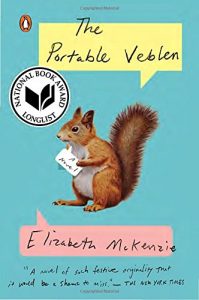 The Portable Veblen was a National Book Award nominee, a Bailey’s prize finalist and talked about on NPR. I found I had an advance copy — and gave it try…especially after reading the book’s publicity blurbs.
The Portable Veblen was a National Book Award nominee, a Bailey’s prize finalist and talked about on NPR. I found I had an advance copy — and gave it try…especially after reading the book’s publicity blurbs.
“A delightfully cockeyed love story that enfolds two splendidly dysfunctional families and a winningly persistent squirrel.”
“No matter how many novels you’ve read, it’s safe to say you’ve never read a novel like The Portable Veblen.”
The main character, Veblen Amundsen-Howda was named after Thorstein Veblen, an early twentieth century economist who despised corporations, materialism, and the consumer class – a sort of Norwegian Henry Thoureau.
Okay, once I had that figured out, I carried on reading.
Our Veblen is plagued by a hypochondriac, verbally abusive mother. Her father is in a mental institution. There’s a stepfather who suffers from PTS. And Veblen herself has a bizarre obsession with squirrels. She talks to squirrels, convinced they’re the only ones who care and understand her life situation.
A few more chapters and we discover that Veblen bites her own arm in times of stress, there’s a strangulation attempt, and the final straw — attempted humor around the abuse of a disabled child.
Had there been a fire in the fireplace I would have burned the thing* — so instead I threw The Portable Veblen on the floor in disgust.
I was forewarned that there would be family dysfunction – (see the blurbs above)…
But these characters go beyond dysfunctional — they are nasty pieces of work and season ticket holders on the crazy train.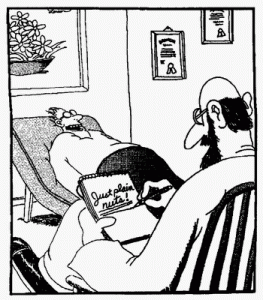
And, my friends, child abuse is never, ever funny.
* When I was a little girl, there was a famous incident in which, disgusted with what he was reading, my grandfather threw the errant book across the room into the fireplace.
Had we had a fire that evening —
I Would Have Done The Same.
The Diver’s Clothes Lie Empty by Vendela Vida
It’s every travelers nightmare ~~ jet lagged, tired, disorientated, and at your most vulnerable ~~ you’re robbed. This is exactly what happens to a nameless American woman in the unconventional novel, The Diver’s Clothes Lie Empty.
While checking into her disappointing hotel in Casablanca, her backpack, holding her wallet, passport, computer, and all her money, is stolen while her back is turned.
(Let me stop here to say I heard Vendela Vida –don’t you love her name?–interviewed on Fresh Air — the author got the idea for this novel after her own experience of being robbed in a foreign country.)
The police investigating the theft are blatantly incompetent, perhaps in on the theft, and in the end return a backpack, but it’s not hers. It contains another woman’s wallet, money, passport, and (still working) credit cards.
While she is understandably panicked by the crime, she realizes she is also strangely free to become anyone she wants to be. Our nameless narrator takes the backpack and assumes the new identity.
Little by little, during this slim little novel, we are given her backstory An ugly divorce and a betrayal by her twin, allows us to understand why she escaped to Morocco and her need to create new personas.
The novel is written in second person singular (i.e.: you)
“You know who you are; other people do not need to.”
This voice is actually more intimate than the first person singular, as if we are co-inhabiting each new identity. She is recruited to play a famous actress’s stand-in for a film being filmed in Casablanca, she substitutes for the actress on a dreaded date with an older gentlemen, and even meets Patti Smith.
Ms. Vida describes the details of our narrator’s experiences through all the senses — we feel the heat, smell the traffic exhaust, but most impressive are the scene descriptions — almost as if they were stage sets:
“…(you) enter an enormous lobby. Its sofas are mocha colored and deep and plush. The kind of sofas that are easy to relax into, and difficult to rise from. White orchids are staged artfully throughout the lobby and Lauryn Hill must pulses softly through the speakers. Everyone is dressed as though going to a business meeting in London or an upscale lunch in New York. No one is dressed as though they are in Morocco…”
Smart and witty, The Diver’s Clothes Lie Empty, explores the possibility of freeing ourselves from the shackles of our identity. How easily appearances, and identities, can be changed. What happens when we choose to become a creation of our own making? When we are able to fully escape our past history?
This is not a travel novel, but rather a reflection on reinvention, lying, and an endless world of possibilities. Shedding her painful past, our narrator restyles herself through several new personas, and finds a surrealistic new freedom on her journey.
The title, by the way, is from a Rumi poem, of the same name which ends,
“Your hidden self is blood in those, those veins that are lute strings that make ocean music, not the sad edge of surf, but the sound of no shore.”
Similarly, Ms. Vida leaves the ending open to the endless possibilities of having “no shore” ~~ as our character assumes yet another identity, but this time, with a hint of future happiness.
An appropriate ending for such a wonderfully unconventional and affecting story.
Vendela Vida, a San Francisco resident, is the co-founder of the literary magazine The Believer. Her husband, Dave Eggers, founded the literary journal McSweeney’s and the wonderful San Francisco literacy project 826 Valencia.
An advanced readers copy was provided by Harper Collins Publishers back in 2015.
Reading in Bed by Sue Gee
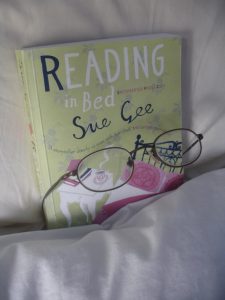 I will spare you the details, but I’ve been unwell. The upside was permission to remain pajama clad and read in bed (in between some epic catatonic naps).
I will spare you the details, but I’ve been unwell. The upside was permission to remain pajama clad and read in bed (in between some epic catatonic naps).
But what to read? I knew I wasn’t up for any Booker prize titles, and reading my Kindle gave me a headache. Then I remembered I had the perfect book for this predicament – Reading in Bed by Sue Gee.
After unearthing it from my shelves and with dutiful tea service provided by Husband, I snuggled in.
One of my favorite British book bloggers Cornflower Books has long recommended anything by Sue Gee. She had me with this statement:
All (her) books are of quality and integrity – they are not showy, not gimmicky, they are perfect examples, I think, of what it means for a writer to be artist and craftsman in equal measure. (The image above is from her blog post.)
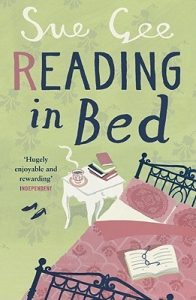 The book opens with long time friends Dido and Georgia as they depart the infamous Hay-on Wye book festival (on my bucket list), and as they make their separate ways home their thoughts and frailties emerge and, in this way, Ms. Gee introduces her readers to her central characters.
The book opens with long time friends Dido and Georgia as they depart the infamous Hay-on Wye book festival (on my bucket list), and as they make their separate ways home their thoughts and frailties emerge and, in this way, Ms. Gee introduces her readers to her central characters.
Two upper middle class Oxford couples, share not only a life-long friendship but also a mutual appreciation of art, classical music, architecture, summer holidays together, – and especially literature:
“Dido and Jeffrey, Georgia and Henry… had reading at the heart of everything, touching and defining everything, a ceaseless inner life so rich it’s hard to say where life and literature begin and end.”
Then death took one half of a partnership. Georgia, widowed a year, is alone with daughter Chloe nearby. Dido, comfortably secure and settled, secretly revels in her seemingly perfect life and husband:
(Her new book) “Justin Cartwright, The Promise of Happiness, just what she needs. She slips off her dressing gown, pulls back the covers. She’s tucked up, her specs on her nose, the pillows just right. She settles into chapter one, is turning page six by the time Jeffrey joins her, fresh from a shower. ‘Hello, my darling.’ ‘Hi’, Jeffrey reaches for his own books, put on his specs. They settle down. Dido is restored. What sweet companionship is this, to read, to sleep, to lie night after night against the man you love – still love after all these years. Poor Georgia.”
I’ll admit Reading in Bed is formulaic, it doesn’t demand much from a reader, but the characters are multi-faceted, intelligent, well developed and flawed — and I cared desperately for each of them. There’s narrow expectations for their children, resulting in the inevitable problems, an eccentric cousin who is loosing her mind, infidelity, illness, and building new beginnings — in other words Ms. Gee has beautifully rendered a well-lived, and loved, set of lives filled with problems, sorrows and joy.
Because I’m an admitted Anglophile, what I (and probably only I) enjoyed most about this British book, was just that — its wonderful, unapologetic, not trying to be anything else — British-ness. The book captures drinking tea in rose filled gardens, shopping in the village, and posh N1 London drinks by a fireplace. There are references to BBC4 shows (the Archers), the Brits keen walking (hiking) outings, and Knickerbocker glories (ice cream sundaes).
Reading a book about women of my same age, with similar views, with my shared love of literature, and so British-ily described was just what the doctor ordered. I’m feeling much better and now I’ve got a new author to follow!
N.B. Ms. Gee’s book are published in the UK, and are only available to us Yanks in their British editions. You can order HERE.



